As part of my series on How to Travel Journal Like a Mapmaker…
Arrows are Lifesavers
Arrows have been a part of human survival for over 20,000 years and amazingly we still rely on them today for our existence.
Not in the traditional sense of course, of going out to hunt for food, but relying on their directives to ensure our safety on the roads.
Arrows are also lifesavers for creating fun story maps!
This simple symbol of a line with a triangle ——> is the perfect expressive tool for illustrating:
- direction
- movement, between two points
- passing of time
So, first things first –
How to Draw an Arrow
For our purposes, a straight lined arrow is, well… dull.
By giving the shaft a curve it creates a sense of life and the illusion of movement. So…
- Draw a curved line, and below it another following the contour of the first but ending so the two lines meet.
- The arrowhead needs to be at right-angles to the shaft so it continues to take the eye in the direction you want it pointing – Extending the shaft a little can help you see where it should sit.
- Colour in the arrowhead.
- As a final touch you can create a sense of depth by adding a third line below the two you have currently representing the shaft, again following the contour you’ve created, then colour this lower section in and it will form an optical shadow.
Arrows to Show Direction
Think of using an arrow wherever there is direction to be conveyed –
They’re wonderful for whooshing from A to B… whether that’s getting you from Home to Work… or even Brisbane to Sydney.
They can have you doing an about turn because you literally went the wrong way, or it can mean you did the U turn figuratively, because you changed your mind 😉
Arrows can have you climbing to the top of a hill or a mountain.
Or have you going down, down, down, into the depths of a valley.
Arrows Showing Movement over Landscape
Arrows eliminate a multitude of fluffy words to convey all manner of travel manoeuvres. 
The illustration on the right is a section from one of my very first story maps. I used the most basic types of line + arrowhead yet it succinctly illustrates how we went both up this section of railway line and later in the day returned down it.
You can either add arrows alongside your mode of travel –
– Such as here beside a railway line, or
– Bedside a footpath, or
– Incorporate triangles within the line type.
Arrows to Illustrate Direction & Movement in Your Travel Journal
The illustration on the right shows an arrow representing both direction and movement.
I flew from Brisbane, down to Sydney –
I usually draw my arrow shafts freehand but in this case there was quite a space between where the arrow started to where it finished and it was fairly imperative I landed on the spot I’d already marked as Sydney –
So I drew this along the edge of a plate!
I drew the left hand line, then by keeping the plate in position in Sydney, I slide the top edge down the page a little to draw the second line – Creating an arrow shaft that is thicker at one end gives the illusion of whooshing through the air from one spot to another!
In the last post I talked of using different line types and suggested dotted lines are great for walking trails –
The Kings Canyon Rim Walk takes you down a series of steps to the Garden of Eden –
To show direction and add movement I added a wiggly arrow pointing down, which conveys the frequent twists and turns the steps took as they hugged the steep cliff face – And the straight arrow for the ladder like steps to clamber back up to the canyon rim on the other side.
On the Kata Tjuta Valley of the Winds walk I used the combination of dots to represent the path we took, which I inserted with squiggly arrows to illustrate both direction and movement around the 7.4km circuit.
The example below, brings together elements from my last post where I spoke of making the most of line types and this post that has focussed on arrows –
Here, I used:
- red arrows alongside the road to show the sections that we drove
- a blue arrow for the ferry ride up the river, and
- red dots to indicate the sections we walked.
- I slipped a little black arrow in to link some information to where it happened.
Combining a variety of line types and arrows not only indicates direction and the illusion of movement – It’s beauty is in its clarity –
At a glance it’s immediately understood where we drove, where we walked and where we ferried.
Arrows to Express the Passing of Time
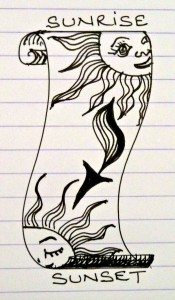
Arrows are also great for expressing the movement of the intangible.
Such as time!
Even on days when we feel we’ve been nowhere, we will have remarkably spun 40,000 km (25,000 miles) through the universe at a speed of 1,600 kph (1,000 mph).
While we may think all we’ve done is watch the sun rise in the east, traverse our blue and fluffy white clouded skies to set in our west…
There’s movement and change in our world every day –
Arrows can even illustrate our life journeys!
I’ve used the story map below as a final illustration in this post on how arrows are great for creating the illusion of movement, as it possibly contains my most dramatic use of them!
Not only the two large swooping arrows to indicate the flights I took, but notice the split arrow head on the road (on the left) showing how upon landing we drove right around Uluru to see it from all angles, before watching the sunset.
This example also touches on the layout of story maps, which I’ll be talking about in more detail in a few posts hence –
But as you can see story maps are not to scale, nor are they in perspective –
They combine side views and aerial views and three-quarter views, so there’s nothing that you have to “get right” artistically – Its a total mish-mash – which is somehow why they work – and why I love them!
The overall effect successfully draws together highlights of the day, which can then be viewed as a whole – simply summarizing the adventure on a single sheet.
No wading though pages and pages of alphanumeric symbols, no sorting of photos, no sticking of scraps – The story is merely mapped out during your evening’s reminiscing.
And in years to come will bring that same smile that you experienced there, back to your face!
In your travel journals –
Do you use arrows to illustrate which direction you went?
Or to show movement between places… or time?
Will you give it a go now? 🙂
Do share in the comments below!
The next post will be on Pictogram type symbols –
I’ll be illustrating symbols for landscape, vegetation, food and drink, transportation and stick figures with personality.
If you don’t want to miss it enter your email below and I’ll give you a cooeee when it’s published 😉



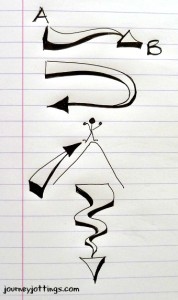
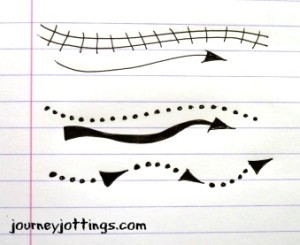

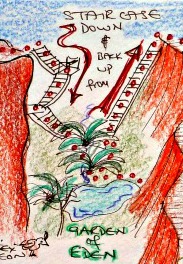


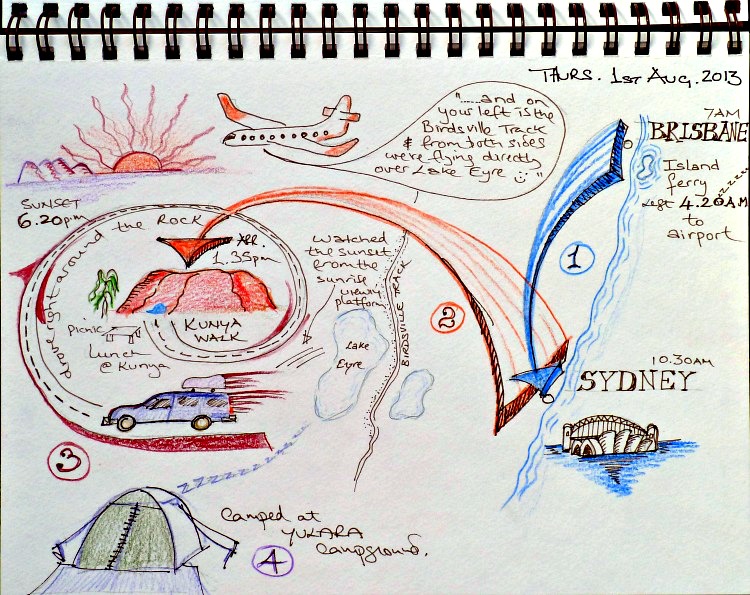



Pingback: How to Make the Most of Line Types to Express Your Travels in a Story Map
You’ve got such interesting and creative ideas. I especially like the idea of drawing lines while sipping wine. 🙂 Love that pic of you with glass in hand.
That’s one of the huge pluses to creating story maps Cathy ~
Rather than locking yourself away at the end of the day to write in a journal to record your trip, you can relive the day over a glass of wine while doodling with some pencils –
Fun at the time, and even more fun down the track when even the memory of creating the journal page will bring a smile back to your face! 🙂
Hi Linda,
It’s starting to sound quite achievable even for a non-arty type like me! I love the mountain climb illustration and that you can make this a social activity. I’d love to try it with my kids. Maybe even when we go camping this weekend.
A workshop would be brilliant and this series has ebook written all over it 🙂
Annabel Candy, Get In the Hot Spot recently posted..How to Overcome Anxiety and Enjoy Epic Adventures
What a wonderful comment Annabel ~
That even “a non-arty type” is contemplating giving these story maps a go!
Ooooo – I hadn’t thought of doing a workshop, but what a fun idea – Where, when, who wants to come?!!!
And yes, pulling an e-book together from these posts so all the info is in the one place sounds like a plan 🙂
I love the idea of doing a story map — my travels around Guatemala and Puerto Escondido Mexico would be perfect for illustrating this way, especially since there’s no wifi. But I’m the absolute worst illustrator – even my grandkids can’t identify what I’ve drawn. But I can surely draw a line so will follow your instructions and give it a try.
michele Peterson recently posted..Creamy avocado dressing: a recipe inspired by Santiago Atitlan, Guatemala
I suspect you’re just a little rusty having not held a pencil since you were your grand-kids’ age?
So I’m very happy to hear you say you’ll “give it a try“!
If you go on any outings with the grandchildren, coming home in the evening and then all creating your own story map version of the day would be a fun collective activity – and an opportunity for the younger ones to give you some pointers as to how they go about wielding a pencil 🙂
Your artwork is stunning. They look like picture postcards~
Recreating a simplified version on a blank postcard would be fun for posting to close family as it would then even have a local stamp and postmark dating it Irene!
Your travel journal looks lovely- arrows and all. Love the colors!
santafetraveler recently posted..Photo of the Week: Rio Grande Del Norte National Monument
I often think its fun to not only take primary coloured pencils with you, but rather select a few tonal colours that reflect the region you’re visiting –
Rusty red was obviously an important colour to take going to the Red Centre, but blue is always a must in Australia whether you’re on the coast or not, as our skies are nearly always a beautiful deep azure blue 🙂
Another great lesson! I am so looking forward to the day when I have time to put some of these practices to the test. I’ve never been able to draw very well, but I think I could learn from you some of these movements with lines.
These posts would be great to accompany you virtually during your next annual break –
As I trust you’ll be doing another fantastic road-trip somewhere in the USA Patti?
Great post! I would love to also draw, but I end up dedicated too much time already to do photography on my travels that I barely have time to soak up the beauty of the location itself
noel recently posted..Mission street art – Travel Photo Mondays
I know exactly what you mean about getting sucked into the vortex of capturing your travels on camera –
I’m a sucker for snapping and shooting too –
But… I encourage you to consider stopping in the evening to mind map your day onto a story map to put all the beautiful photographs you’ve taken into the context of your life and the wonderful locations you visit 🙂
My kids and grandkids are planning a few trips and I can’t wait to show them your tutorials. We will have a blast drawing these maps. I’ll be inspired to sip a glass of wine (or 2) and toast you each time.
I love the social component of story maps too… as you can see from the photo in the post! 😉
I love your drawings and story maps. Who would have thought an arrow could convey so much?!!
Exactly my point – a few simple lines and arrows can express so much more that fluffy words that will more often than not fumble over each other, flop down and fail! 😉
You are so creative and a very talented artist indeed. I may need to print some of these directions out for trips where I lose my mind without wifi. I really think this would be a great substitute!
You may find creating story maps of your trips so meditative and therapeutic that there’ll be no turning back!
And it will be when you have the wifi that you’ll feel you’re losing your mind! 😉
You are so very gifted and inspiring. I love love love the way you express yourself. Thank you for unselfishly sharing it with the rest of us!
Because our education systems focus so strongly on left brain language communication (meaning the majority of assignments are written submissions) I think we get out of practice or even thinking that writing is not the only way to communicate thoughts –
I’m keen to re-open and remind the world that there are ‘alternative’ (and better) ways of expressing oneself! 🙂
This makes me want to start a real travel journal.
Brilliant! Do it LOL
You’ll be amazed how much more of your travels you remember by creating a little story map of your day each evening –
My next post shows the use of pictogram symbols, which are fantastic for remembering what foods you’ve come across 🙂
I will for sure.
A Cook Not Mad (Nat) recently posted..King of the slow cookers
Fairly recently, I started mucking about with “Zentangle” Inspired Art. I’m currently trying to figure out shadowing to lend depth and perspective, so this tutorial about lines and arrows is very timely for me. I look forward to your next post.
There will be a post coming up Suzanne to talk of shading and giving a 3D effect on a 2D paper plane –
I’m thrilled to hear you’re getting your sea legs back in the creative-doodling sphere 🙂
This fascinates me! To the extent that I could do it at all it would have to be done with at least one glass of wine! I’d like to get my sister to start doing this with our travels – I’m the word person and she’s the visual one. Do you write these by hand and then photograph them or do you also use some software to create them?
I draw/doodle them by hand and then photograph them to put into posts (like this!)
I love the hard copy aspect of them for posterity.
But a glass of wine wouldn’t go amiss to get the ball rolling 🙂
Pingback: The Laid Back Travel Journal Layout - How to Story-Map Your Day
After 25 years of travelling you have inspired me to start recording my adventures. Story Maps what a great idea
Hey Adam ~ So thrilled to hear you too are inspired by Story Maps!
I’ve just started a daily posting to MyStoryMaps Instagram account if you’re looking for further inspiration ~
I’m also doing a Workshop up in Toowoomba, Qld at the end of July, which will hopefully get turned into more blog posts 😀
Hi, I love your ideas. Although I am a sketcher, I travel with non-sketchers so take only a little time along the way to sketch what I am seeing. From now on I plan to incorporate your inventive ideas into my travel sketchbook. Thanks so much for your generous spirit in sharing these with us!
Hi Diane,
So happy these ideas have struck a chord with you 🙂
Incorporating a quick 10 minute sketch of a detail done on location, with a more symbolic pictogram of the whole set into a story map of your day could be a great way to speed up the process for your patient friends!
I hope to collate all my ideas into an ebook – so stay tuned 😀
I absolutely love your ideas for travel maps. I am doing a two week driving trip around the south of England later this year and I think it will begin with a big arrow showing my flight from Sydney to Singapore to London first. I’ll need a thick notebook. Your illustrations are beautiful.
Thank you so much Sharn 🙂
You may want to consider a Concertina type journal for your trip – I’ve now used this variety for the past few trips I’ve done and love them because I always feel no two days are really the same length – Meaning some days one does a million things and on another – the day just passes by – So unlike a ‘normal’ journal where the page is a fixed size – Concertina journals allow some days to spread over several pages and remain connected – and other days they can be encapsulated in a corner!
I talk about them a little about half way down this post: https://journeyjottings.com/blog/2017/03/less-is-more-way-of-travel-journalling/ –
Click here to see the journals I mean 🙂
All the best for your trip – and if you care to share some pages when you get back let me know and I’ll send you the questions I ask of travellers to feature in this series of Interviews 😀